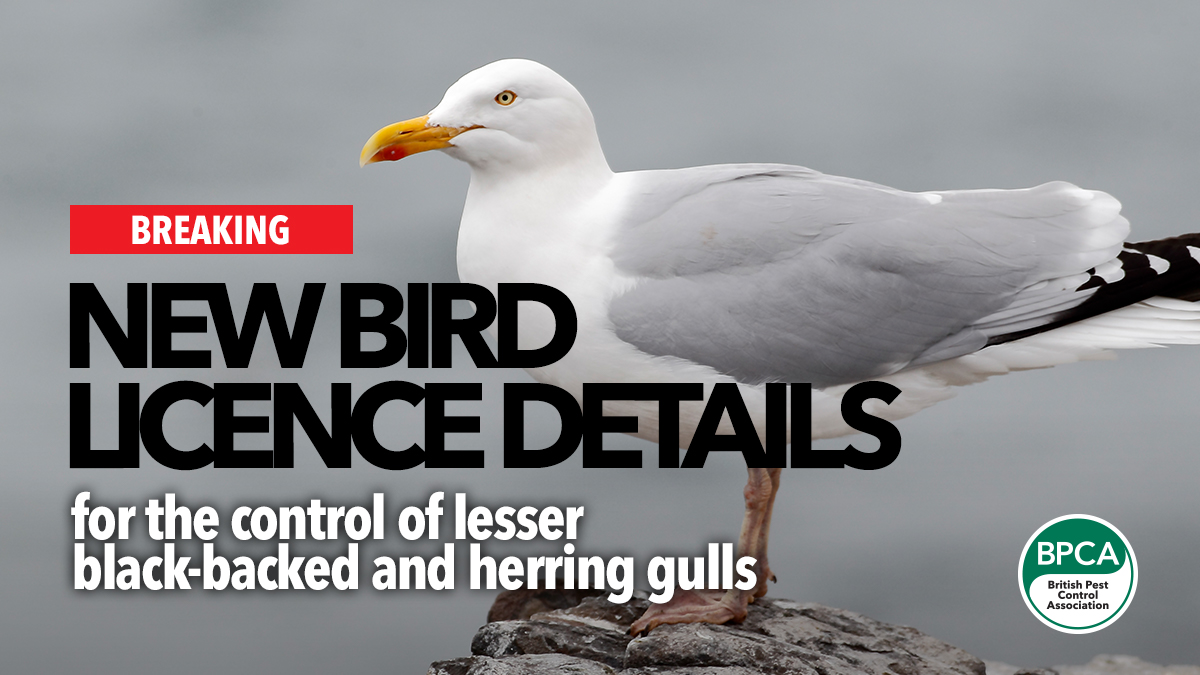Natural England has today [Thursday 30 January] set out changes to licences for the lethal control of herring gulls and lesser black-backed gulls in England.

Owing to their poor conservation status, herring gulls and lesser black-backed gulls were not included in Defra’s general licences issued last year.
The breeding population of herring gull has fallen by 60% in recent decades, with lesser black-backed gulls declining by an estimated 48%.
Defra’s general licences for birds will continue to omit these species, because of their poor conservation status.
Commenting on the new details, Dee Ward-Thompson, BPCA Technical Manager said:
"These new licences take into consideration outstanding issues around both conservation and protecting public health.
"The information available is very detailed and provides all the steps needed should you need to control either of these species, so it's recommended that you read this thoroughly.
"If you do have any concerns or questions which are not answered in the FAQ, BPCA's technical team is here to help BPCA members."
What should you do if you need to undertake lethal control?
Natural England have issued a class licence to permit any wild bird control necessary to preserve air safety which covers herring gulls and lesser black-backed gulls.
Beyond this, Natural England will license gull control through individual licences.
To control the lesser black-backed gull or herring gull to prevent disease, damage or risk to public health and safety, you should apply for licence A08.
You can find more details here.
When to apply
You can apply for licence A08 if you need to control wild birds because you have concerns about:
- Disease or damage to agricultural land
- Public health and safety
- Conserving plants and animals.
First check your circumstances are not covered by a general licence for birds.
Using this licence you can control wild birds, their nests and eggs by:
- Disturbing them
- Killing them
- Taking them
- Using a prohibited method of control on them.
This licence is free. Natural England will decide whether to issue a licence within 30 working days of receiving your application.
You should apply before 15 March 2020, in preparation for bird breeding season.
Natural England will continue to accept licence applications outside this period and will issue licences where there is an imperative need.
Applications that have already been made will still be considered by Natural England.
Differences for urban vs rural sites
You will need to tell Natural England whether the site where you need to control gulls is ‘urban’ or ‘rural’. These are the only two categories.
Urban sites include:
- Land and buildings within villages, towns and cities
- Power stations, business units and major industrial buildings
- Schools, universities and hospitals.
Problems at urban sites will normally involve nesting gulls and risks to public health and safety.
Natural England are working with Defra to explore options for filling current gaps in evidence around urban gull populations.
Important: Applications for urban sites must include an integrated management plan.
Rural sites include:
- Landfill sites
- Airports and aerodromes
- farms
- Reservoirs, fisheries and other large water bodies
- Nature reserves
- Shooting estates.
Although some of these rural sites may be close to towns or cities, they are considered rural to allow Natural England to look at impacts on different gull populations.
For ‘rural’ herring gull and lesser black-backed gull each licence application will be considered on an individual basis against set criteria, but generally protecting human life and health will be the overriding priority.
Any control undertaken under other purposes such as preventing serious damage and conserving wild birds and flora or fauna will need to be targeted.
Further guidance regarding licences to control lesser black back gulls or herring gulls is available here.
You should read all the information made available as thoroughly as possible before submitting applications.
In these cases, Natural England will contact applicants if any further information is required in order for them to assess the application.
There is also a Q&A which can be viewed here.
Source: Natural England press release